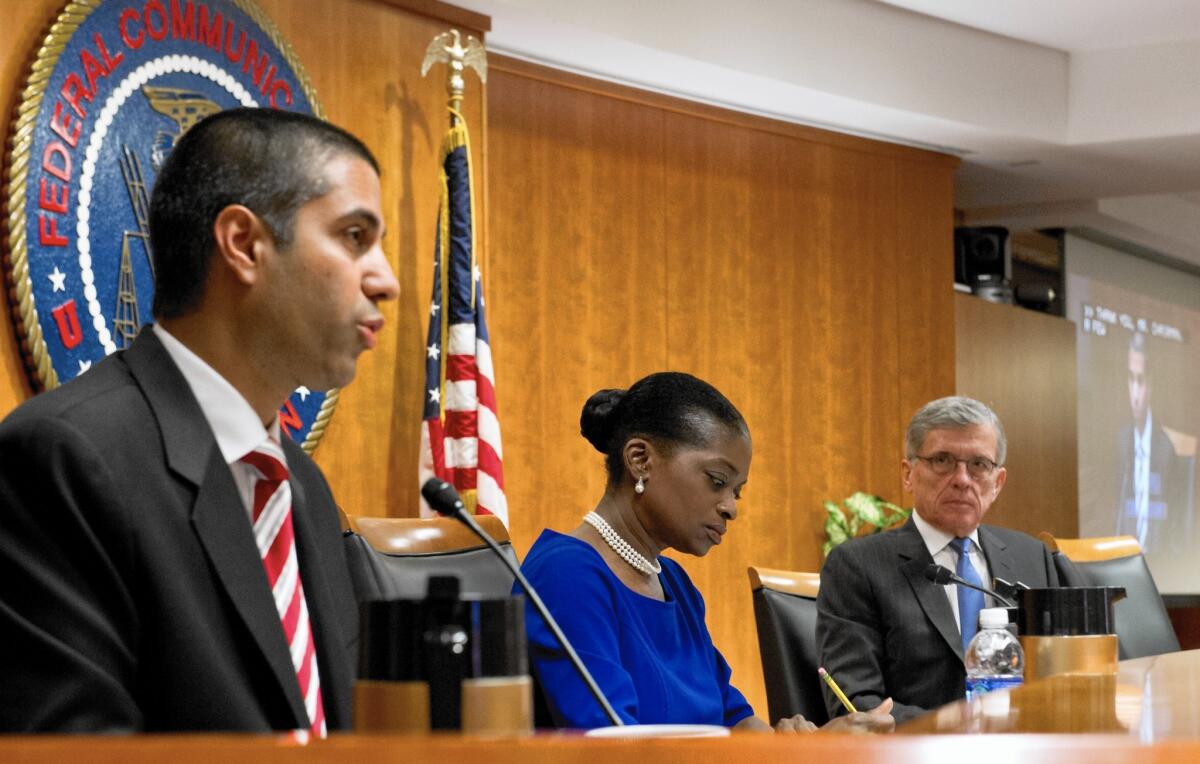FCC’s new net neutrality rules are sure to be challenged

- Share via
Reporting from washington — After two failed attempts to enact rules for Internet traffic, regulators adopted a heavily criticized — but legally stronger — strategy to try to make sure their net neutrality rules stand up in court.
But an expected lawsuit is only one hurdle for the new policy.
The plan that the Federal Communications Commission approved this week treats broadband as a more highly regulated telecommunications service, directly addressing a problem federal judges found last year in the agency’s last attempt to create net neutrality regulations.
The move should keep the new rules, designed to ensure the uninhibited flow of data online, from being overturned, said Marvin Ammori, an affiliate scholar at Stanford Law School’s Center for Internet and Society.
“I am about as confident as you can be,” said Ammori, who argued an earlier net neutrality case before appellate judges as general counsel for digital rights group Free Press.
But critics of FCC Chairman Tom Wheeler’s proposal, which passed on a party-line 3-2 vote by the Democrat-controlled agency, said there still were legal problems in the new approach that could cause the regulations to be struck down.
“Litigants are already lawyering up to seek judicial review of these new rules,” said Ajit Pai, a Republican on the FCC who voted against the order establishing the regulations. “Given the order’s many glaring legal flaws, they will have plenty of fodder.”
He and fellow Republican Michael O’Rielly laid out some of those problems in lengthy dissents that could serve as a road map for telecom industry lawyers looking to challenge the new regulations.
There are signs, however, that opponents of tough net neutrality regulations aren’t as confident as in the past about winning in court.
Key congressional Republicans have introduced net neutrality legislation that takes a less expansive approach than the FCC but still goes against the party’s long-standing view that the issue did not require regulations. The bill would override the FCC’s new rules.
And Republicans also are looking to the 2016 presidential election. If their party wins the White House, it would gain control of the FCC, which, they predict, would reverse course on net neutrality.
The new regulations “could be vacated by the courts, overturned by Congress or could be rejected by a future commission,” Pai said. “I’m confident that at least one of these things will happen.”
The 317-page net neutrality order, which has not been made public yet, prohibits broadband providers from blocking, slowing or selling faster delivery of legal content flowing through their networks.
Wheeler said he hopes to put it on the agency’s website as soon as possible, after staffers complete procedural steps.
After it’s public, one or more broadband service providers or trade associations are expected to challenge it in court.
When the FCC publicly released looser net neutrality regulations in late 2010, Verizon Communications Inc. filed an appeal 28 days later with the U.S. Court of Appeals for the District of Columbia.
Verizon won that case in January 2014. The judges ruled that the FCC was trying to treat broadband providers like more highly regulated conventional telephone companies without formally classifying them that way under Title 2 of the telecommunications law.
The new FCC plan tries to address that problem by classifying broadband providers as telecom services under Title 2. Wheeler said that was a reason he had “great confidence” the regulations would withstand legal challenges.
Ammori and other advocates of strong net neutrality regulations have been pushing for the FCC to use Title 2 for years.
The need for rules became clear, he said, after an appeals court in 2010 overturned an FCC decision against Comcast Corp. The agency had found that the cable carrier had violated the first net neutrality rules by blocking some customers from using BitTorrent Inc. technology to easily download videos.
“After the Comcast case, it was pretty delusional not to go to Title 2,” he said.
But facing strong opposition from the industry and Congress for that route, the FCC decided to try again to craft rules without reclassifying broadband service.
“All of us knew that it would get thrown out in court,” Ammori said about the second attempt.
Wheeler, who at first tried to come up with a similar solution, decided instead to follow the court’s suggestion and reclassify broadband as a utility to get clear authority to create and enforce net neutrality rules.
Even so, the regulations the FCC approved Thursday required it to take a different step that judges could question, said Robert McDowell, a Republican who served on the FCC from 2006 to 2013.
This week’s vote reversed a 2002 agency decision that had treated broadband as a lightly regulated information service, not a Title 2 service.
Such a move would be justified if there were “a dramatic change in facts or law,” said McDowell, a senior fellow at the Hudson Institute. But he doesn’t believe either of those have taken place, giving a court the basis to decide the move was “arbitrary and capricious.”
“The FCC is busy writing one of the longest orders in its history precisely because neither the facts nor the law support its position,” he said. “As Ricky Ricardo would say, they’ve got ‘a lot of ‘splaining to do.’”
O’Rielly cited the reversal of the 2002 decision as one of the legal problems in his dissent. He said the regulations were “not supported by evidence of actual harms.”
In addition, the wireless industry argues that Congress prohibited the FCC from expanding its regulatory oversight to mobile broadband.
A 1993 law classified mobile voice calling as a Title 2 telecommunications service but specifically left other wireless service out.
More to Read
Inside the business of entertainment
The Wide Shot brings you news, analysis and insights on everything from streaming wars to production — and what it all means for the future.
You may occasionally receive promotional content from the Los Angeles Times.











